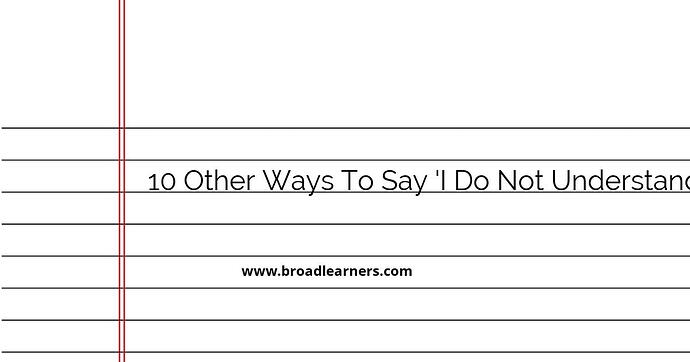When you don't understand something, it's important to communicate your confusion clearly. Instead of simply saying 'I do not understand,' you can use alternative phrases to express your lack of comprehension in a more effective way. Here are 10 other ways to say 'I do not understand':
- I'm sorry, but I'm having trouble following.
- I'm afraid I don't quite grasp what you're saying.
- I'm having difficulty comprehending.
- I'm not quite catching on. Could you please explain further?
- I'm struggling to make sense of this.
- I'm finding it hard to wrap my head around.
- I'm at a loss as to what you mean.
- I'm not getting the gist of your message.
- I'm puzzled by what you're trying to convey.
- I'm unsure of what you're trying to get across.
These alternative phrases can help you express your confusion in a polite and professional manner. Let's look at some examples of how to use them:
1. I'm sorry, but I'm having trouble following.
If someone is explaining a complex concept and you're finding it difficult to understand, you can say:
I'm sorry, but I'm having trouble following. Could you please break it down into simpler terms?
2. I'm afraid I don't quite grasp what you're saying.
If someone is sharing information or giving instructions that you're having trouble comprehending, you can say:
I'm afraid I don't quite grasp what you're saying. Could you provide some more clarification?
3. I'm having difficulty comprehending.
If you're struggling to understand a complex document or piece of information, you can say:
I'm having difficulty comprehending this document. Is there someone who can help me break it down?
4. I'm not quite catching on. Could you please explain further?
If you're in a learning or training setting and you're having trouble understanding a concept, you can say:
I'm not quite catching on. Could you please explain it in a different way or provide more examples?
5. I'm struggling to make sense of this.
If you're faced with a confusing situation or problem, and you need more clarity, you can say:
I'm struggling to make sense of this. Can someone help me understand what's going on?
6. I'm finding it hard to wrap my head around.
If you're having difficulty understanding a complex concept or idea, you can say:
I'm finding it hard to wrap my head around this concept. Can you provide some additional resources or explanations?
7. I'm at a loss as to what you mean.
If someone's statement or request is unclear to you, you can say:
I'm at a loss as to what you mean. Could you please give me more context or clarify your intention?
8. I'm not getting the gist of your message.
If you're having difficulty understanding the main point or idea someone is trying to convey, you can say:
I'm not getting the gist of your message. Can you please rephrase it or provide more details?
9. I'm puzzled by what you're trying to convey.
If someone's explanation or statement is confusing or unclear, you can say:
I'm puzzled by what you're trying to convey. Can you please elaborate or give more examples?
10. I'm unsure of what you're trying to get across.
If you're having trouble understanding someone's intention or point, you can say:
I'm unsure of what you're trying to get across. Can you provide more context or explain it in a different way?
Using these alternative phrases will help you effectively communicate your lack of understanding while maintaining professionalism and politeness. Remember, it's important to ask for clarification when needed to ensure effective communication.
Did I miss anything? Respond below
